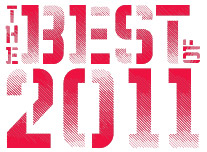
 Panda Bear
Panda BearTomboy
Paw Tracks
It’s not another Person Pitch, and yes, “hardcore” fans of that record may have been a bit disappointed, but therein lies the beauty of Noah Lennox’s fourth solo album. Where Person Pitch was raucous, chaotic and full of surprises, Tomboy is darker, deliberate and slightly tamer—adjectives until now I never thought I’d use to describe anything relating to Animal Collective. However, Lennox has infused these comparatively subdued songs with a depth that always seemed to hide behind rebellious bursts and formulaic crescendos on previous albums. Full of beautifully layered vocals set amidst hazy, and at times, frantic backdrops, Tomboy is quintessential Panda Bear (on sedatives)—completely hypnotic and strangely addicting. JF
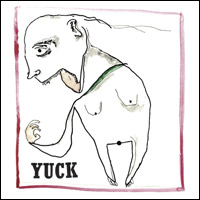
 Yuck
YuckYuck
Fat Possum
It’s nearly impossible to mention the London-based four-piece Yuck without mentioning the obvious influences of bands like Dinosaur Jr, Smashing Pumpkins and My Bloody Valentine strained through their fuzzy guitars. There’s the wall of sound, dreamy guitars and lazy vocals of the seven-minute “Rubber” for residents of Sonic Youth’s Daydream Nation, and even the sunny pop of “Georgia” has a tinge of melancholy and nostalgic wistfulness, as if mourning its ’90s predecessors’ passing. Yet the band’s fresh energy defies easy categorization, as vocalist Daniel Blumberg in “Stutter” proclaims, “Time is on the outside looking in.” JR

 Psandwich
PsandwichNorthren Psych
Columbus Discount
After a notable hiatus from recording and performing, the poet laureate of the Columbus rock underground, Ron House, returned in 2011 with his first new band since forming the Thomas Jefferson Slave Apartments almost two decades ago. To say that Psandwich and the band’s excellent debut LP, Northren Psych (the spelling is intentional) represents a mellowing for House would be disingenuous and wrong. His voice remains as cantankerous as ever, like an extremely brilliant and articulate toddler on an epic rant about the vicissitudes of art and life. And his new backing band (comprised entirely of musicians he hardly knew let alone ever played with) offers sprawling, jagged walls of distortion over which House can serve up his barroom treatises. Still, Psandwich signals a new direction—or at least new possibilities—for a legend thought to have called it a day. As one of the song titles here suggests, House still has something to prove... and nothing to lose. NK

 Fleet Foxes
Fleet FoxesHelplessness Blues
Sub Pop
In an excellent piece for the AV Club, Steven Hyden called 2011 “the year of boring,” identifying Fleet Foxes as one of the bands leading the pack. Hyden didn’t say boring was bad necessarily; he merely defined it as a series of musical attributes that go down smooth to broad audiences. And in a sense, he’s right about Fleet Foxes: Helplessness Blues is not a particularly challenging, experimental, or confrontational album. But it is a gorgeous and intricate Astral Weeks–inspired slice of folk that could melt the heart of the crustiest punk. Is this the dawn of a post-genre world? Probably not. But while a million NPR listeners can be wrong, they got it right with Helplessness Blues. DH
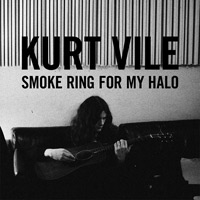
 Kurt Vile
Kurt VileSmoke Ring for My Halo
Matador
The inconspicuous essence of Kurt Vile’s sure to be deemed masterpiece is not meant to neck-grab or even palm-clasp you into it. It’s 12:45am ruminating folk, best left to your weakest mood points on the rainiest nights. Vile wants to be alone too, or so it seems. Like most such strumming that doesn’t instantly warble “lame hippie,” Vile has true brimming talent and personality that, like all the greats to which he’s inevitably compared (Dylan, Springsteen, Westerberg), he tries hard to schlub over with hunched shoulders, farmhouse hibernating, and mystery cultivating. Also like those comparable greats, Vile somehow adds something about as “new” as any such singer-songwriter can conjure at this point, with a jangly guitar swelling style, subtly snotty singing, and that misty vibe. And the songs are simply gorgeous while tuned into a garage rock–sprung understanding of raw recording. ED
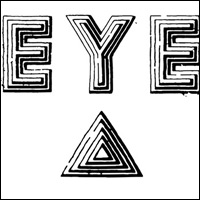
 EYE
EYECenter of the Sun
self-released
Druids, wizards, warriors, sorcerers, journeymen, Sabbath, Floyd, a mage and a giant winged eyeball shooting a rainbow laser beam through the wall of the universe—these are the images that popped into my head after the first 60 seconds of the 19 and a half minutes of the title track to EYE’s debut album. From there, the album charges full-bore through all four tracks without a second of dull, masturbatory guitar diddling, triplet-heavy drum soloing or Moog-tastic squiggles. EYE is the super power-trio that rose from the ashes of Columbus sludge-metal overlords Teeth of the Hydra and psychic stoner rockers Pretty Weapons. Deadsea’s Adam “Smitty” Smith lent his extensive analog synth library and engineering skills to help produce Center of the Sun, but this record is but a mere hint of the trio’s live show, which is essentially an attention-grabbing Guantanamo. You can’t look away, and your girlfriend will shush you when you try to tell her how awesome you think it is because she’s listening so hard. MPO
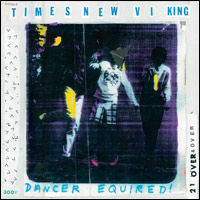
 Times New Viking
Times New VikingDancer Equired
Merge
Never a band to rest on their laurels, Times New Viking took a few steps forward with Dancer Equired. One of those steps was literal, with the trio moving into a proper studio (Columbus’ venerable Musicol) for an analog sound that manages to be as unique in its expansive warmth as the band’s previous efforts were in their overdriven fuzz. Even more significant, though, was the band’s growth in its songwriting. Dancer Equired’s 14 songs strike a remarkable balance between the manic energy for which TNV has been known and a fully developed maturity. It’s always risky for bands—especially successful ones—to move beyond what’s comfortable and proven, but the risk has paid off here, as Dancer Equired is a fantastic collection of raw gold. RW

 Shabazz Palaces
Shabazz PalacesBlack Up
Sub Pop
“Clear some space out, so we can space out” repeats Ishmael Butler towards the end of Black Up. A suitable operandi for an entity that refuses to be pinned down, Butler re-emerged amongst hungrier, younger rappers, but it didn’t matter. With darkened, sociopolitical cuts (“Things are looking blacker, but black is looking whiter”) right next to show-off word-slaying (“dynamic electromagnetic style utensils”), at a scant 36 minutes, Black Up might be the densest thing in hip-hop history. Swerving, playful, ominous and illusive, its only constant is how impossible it is to fuck with. LW

 Zola Jesus
Zola JesusConatus
Sacred Bones
Over the last two years, Nika Roza Danilova (a.k.a. Zola Jesus) has evolved from the latent noisescapes of her early years into a realm of sounds much more majestic. Where once she muddled in bedroom-recorded confines, she has since progressed to become the modern day heir apparent to Siouxsie Sioux, combining the dramatic with the poptastic. Conatus capitalizes on her two EPs from last year, Stridulum and Valusia, and is her most concise artistic expression yet. Songs like “Hikikomori” and “Seekir” are 21st century goth at its finest, delighting in depressive undertones and the joy of our bleak future, though the coming years look much more bright for our heroine. SS

 Iceage
IceageNew Brigade
What’s Your Rupture?
Punk has never completely disappeared, but rather become completely unrecognizable after splitting into specialized sub-genres, as well as being parodied, exaggerated and mocked. In essence, it just has less meaning than it once did. All the more reason that we needed a band like Denmark’s Iceage to craft a debut that not only captures the spirit of the classics (Wire, Warsaw, Crass and Discharge), but is also an urgent call-to-arms revealing that punk is still a vital resource for catharsis. Though the hype was at full tilt by the end of Iceage’s first American tour, it was hard to ignore the magnetic force of New Brigade. Youth and nihilism, chaos and melody, blood and bruise—by record’s end, even if you’re not convinced that there’s a revolution going on, you’re a believer in Iceage’s visceral energies and groundbreaking appeal. KJE
